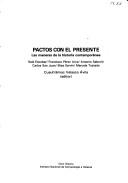| Listing 1 - 7 of 7 |
Sort by
|
Book
ISBN: 9686038256 Year: 1985 Publisher: México, D.F. Instituto Nacional de Antropología e Historia
Abstract | Keywords | Export | Availability | Bookmark
 Loading...
Loading...Choose an application
- Reference Manager
- EndNote
- RefWorks (Direct export to RefWorks)
Book
Year: 2015 Publisher: Washington, D.C., The World Bank,
Abstract | Keywords | Export | Availability | Bookmark
 Loading...
Loading...Choose an application
- Reference Manager
- EndNote
- RefWorks (Direct export to RefWorks)
This paper studies the sharp increase in violence experienced in Mexico after 2006, known as "The War on Drugs," and its effects on human capital accumulation. The upsurge in violence is expected to have direct effects on individuals' schooling decisions, but not indirect effects, because there was no severe destruction of infrastructure. The fact that the marked increases in violence were concentrated in some municipalities (and not in others) allows for implementation of a fixed-effects methodology to study the effects of violence on educational outcomes. Different from several recent studies that have found significant negative effects of violence on economic outcomes in Mexico, the paper finds evidence that this is not the case, at least for human capital accumulation. The paper uses several sources of data on homicides and educational outcomes and shows that, at most, there are very small effects on total enrollment. These small effects may be driven by some students being displaced from high-violence municipalities to low-violence municipalities; but the education decisions of individuals do not seem to be highly impacted. The analysis discards the possibility that the effects on enrollment of young adults appear small because of a counteracting effect from ex-workers returning to school. The results stand in contrast with recent evidence of the negative effects of violence on short-term economic growth, since minimal to null effects on human capital accumulation today should have little to no adverse effects on long-term growth outcomes in Mexico.
Crime --- Crime and Society --- Education --- Education for All --- Fixed Effects --- Population Policies --- Tertiary Education --- Violence
Book
Year: 2015 Publisher: Washington, D.C., The World Bank,
Abstract | Keywords | Export | Availability | Bookmark
 Loading...
Loading...Choose an application
- Reference Manager
- EndNote
- RefWorks (Direct export to RefWorks)
This paper studies the sharp increase in violence experienced in Mexico after 2006, known as "The War on Drugs," and its effects on human capital accumulation. The upsurge in violence is expected to have direct effects on individuals' schooling decisions, but not indirect effects, because there was no severe destruction of infrastructure. The fact that the marked increases in violence were concentrated in some municipalities (and not in others) allows for implementation of a fixed-effects methodology to study the effects of violence on educational outcomes. Different from several recent studies that have found significant negative effects of violence on economic outcomes in Mexico, the paper finds evidence that this is not the case, at least for human capital accumulation. The paper uses several sources of data on homicides and educational outcomes and shows that, at most, there are very small effects on total enrollment. These small effects may be driven by some students being displaced from high-violence municipalities to low-violence municipalities; but the education decisions of individuals do not seem to be highly impacted. The analysis discards the possibility that the effects on enrollment of young adults appear small because of a counteracting effect from ex-workers returning to school. The results stand in contrast with recent evidence of the negative effects of violence on short-term economic growth, since minimal to null effects on human capital accumulation today should have little to no adverse effects on long-term growth outcomes in Mexico.
Crime --- Crime and Society --- Education --- Education for All --- Fixed Effects --- Population Policies --- Tertiary Education --- Violence


ISBN: 968429168X Year: 1980 Publisher: México, D.F. Editorial Nueva Imagen
Abstract | Keywords | Export | Availability | Bookmark
 Loading...
Loading...Choose an application
- Reference Manager
- EndNote
- RefWorks (Direct export to RefWorks)
Book

ISBN: 0833081136 0833076728 9780833076724 9780833081131 Year: 2013 Publisher: Santa Monica, CA RAND
Abstract | Keywords | Export | Availability | Bookmark
 Loading...
Loading...Choose an application
- Reference Manager
- EndNote
- RefWorks (Direct export to RefWorks)
Greenhouse gas mitigation --- Methane --- Civil & Environmental Engineering --- Engineering & Applied Sciences --- Environmental Engineering --- Government policy --- Evaluation --- Environmental aspects --- Methyl hydride --- Abatement of greenhouse gas emissions --- Emission reduction, Greenhouse gas --- Emissions reduction, Greenhouse gas --- GHG mitigation --- Greenhouse gas abatement --- Greenhouse gas emission reduction --- Greenhouse gas emissions reduction --- Greenhouse gas reduction --- Mitigation of greenhouse gas emissions --- Reduction of greenhouse gas emissions --- Alkanes --- Manure gases --- Biogas --- Pollution prevention --- United States. --- Evaluation. --- Gosdepartament SShA --- 美国. --- DOS


ISBN: 9682950813 Year: 1993 Publisher: México, D.F. Instituto Nacional de Antropología e Historia
Abstract | Keywords | Export | Availability | Bookmark
 Loading...
Loading...Choose an application
- Reference Manager
- EndNote
- RefWorks (Direct export to RefWorks)
Book

ISBN: 9786070304583 Year: 2013 Publisher: México, D.F. Instituto Nacional de Antropología e Historia
Abstract | Keywords | Export | Availability | Bookmark
 Loading...
Loading...Choose an application
- Reference Manager
- EndNote
- RefWorks (Direct export to RefWorks)
Social stratification --- Sociology of culture --- Internal politics --- Economic conditions. Economic development --- anno 1800-1999 --- anno 2000-2009 --- Mexico
| Listing 1 - 7 of 7 |
Sort by
|

 Search
Search Feedback
Feedback About UniCat
About UniCat  Help
Help News
News